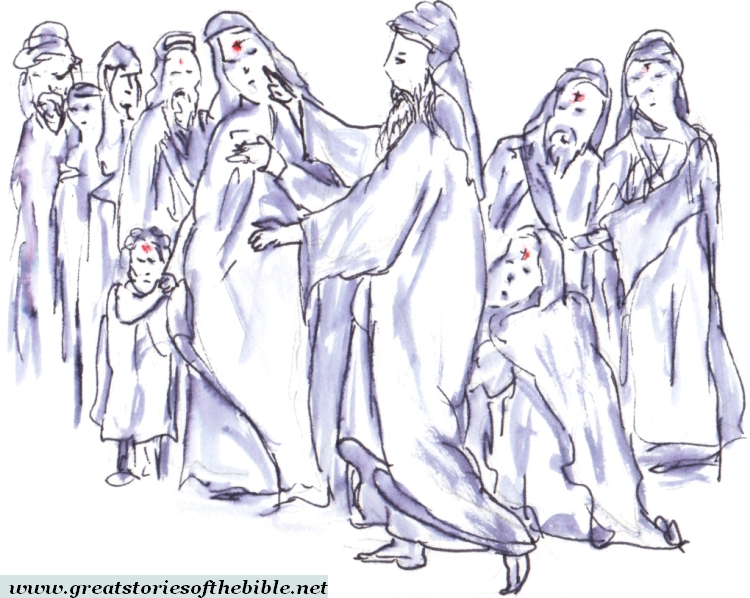Ezekiel - episode 2
I have made you a watchman
We continue Ezekiel’s story. After seven days when he sits overwhelmed (because of the divine visions he saw), the prophet receives again the Lord’s Word, confirming his ministry. «“Son of man, I have made you a watchman to the house of Israel: therefore hear the word from my mouth, and give them warning from me. When I tell the wicked, ‘You shall surely die’; and you give him no warning, nor speak to warn the wicked from his wicked way, to save his life; that wicked man shall die in his iniquity; but his blood will I require at your hand. Yet if you warn the wicked, and he doesn’t turn from his wickedness, nor from his wicked way, he shall die in his iniquity; but you have delivered your soul. “Again, when a righteous man does turn from his righteousness, and commit iniquity, and I lay a stumbling block before him, he shall die: because you have not given him warning, he shall die in his sin, and his righteous deeds which he has done shall not be remembered; but his blood will I require at your hand. Nevertheless if you warn the righteous man, that the righteous not sin, and he does not sin, he shall surely live, because he took warning; and you have delivered your soul.”» (Ezek 3,16-21).
The Book of Ezekiel can be divided by theme into three main sections: chapters from 1 to 24 contain oracles against Israel; chapters from 25 to 32 report oracles against the foreign nations; chapters from 33 to 48 are about Israel and its institutions’ restoration, by the Lord’s free and undeserved intervention. Let us go on in the first section reading. Ezekiel’s ministry starts with some symbolic actions (see Jeremiah - episode 3), a means of communication that is usually reserved to the most challenging and hardened audience, for whom words alone are not enough. I invite you to read how the prophet prefigures in this way the future Jerusalem siege (chapters 4-5), by a tile, the position of his body, food and drink measured for many days and by shaving his head and beard (a sign of humiliation and shame, see 2Sam 10,1-5).
«Moreover the word of the LORD came to me, saying, “You, son of man, thus says the Lord GOD to the land of Israel, ‘An end: the end has come on the four corners of the land» (Ezek 7,1-2); the Lord takes Ezekiel to Jerusalem in vision and He shows him many idolatries and violence that anger the Lord (chapter 8). «Then he cried in my ears with a loud voice, saying, “Cause those who are in charge of the city to draw near, every man with his destroying weapon in his hand.” Behold, six men came from the way of the upper gate, which lies toward the north, every man with his slaughter weapon in his hand; and one man in their midst clothed in linen, with a writer’s inkhorn by his side. They went in, and stood beside the bronze altar. The glory of the God of Israel was gone up from the cherub, whereupon it was, to the threshold of the house: and he called to the man clothed in linen, who had the writer’s inkhorn by his side. The LORD said to him, “Go through the midst of the city, through the midst of Jerusalem, and set a mark on the foreheads of the men that sigh and that cry over all the abominations that are done in its midst.” To the others he said in my hearing, “Go through the city after him, and strike: do not let your eye spare, neither have pity; kill utterly the old man, the young man and the virgin, and little children and women; but do not come near any man on whom is the mark: and begin at my sanctuary.” 
Then they began at the old men that were before the house. He said to them, “Defile the house, and fill the courts with the slain. Go forth!” They went forth, and struck in the city. It happened, while they were smiting, and I was left, that I fell on my face, and cried, and said, “Ah Lord GOD! Will you destroy all the residue of Israel in your pouring out of your wrath on Jerusalem?” Then he said to me, “The iniquity of the house of Israel and Judah is exceedingly great, and the land is full of blood, and the city full of perversion: for they say, ‘The LORD has forsaken the land, and the LORD doesn’t see.’ As for me also, my eye shall not spare, neither will I have pity, but I will bring their way on their head.” Behold, the man clothed in linen, who had the inkhorn by his side, reported the matter, saying, “I have done as you have commanded me.”» (Ezek 9). The “destroyers” and the sign that saves from death remind one of the founding moments of Israel’s story: the first Passover night, in which the Lord killed all the Egyptians firstborns, sparing the Hebrew ones because of the lamb’s blood on their doors (see Exod 12). However, the present destruction is for the unfaithful people of Israel itself; the Lord will only save a “remnant” (see Isaiah - episode 4) who suffered for all the evil the people did. The Book of Revelation recalls the «mark on the forehead» as a sign of the “servants of God” (see Rev 7,2-4; 9,4).
In the conclusion of the visions something unprecedented happens: the Lord’s Glory, after going out from the Temple (Ezek 11,18-22), leaves Jerusalem (Ezek 11,22-23). «The Spirit lifted me up, and brought me […] into Chaldea, to them of the captivity. […] Then I spoke to them of the captivity all the things that the LORD had shown me» (Ezek 11,24-25).
Follow in the next post.